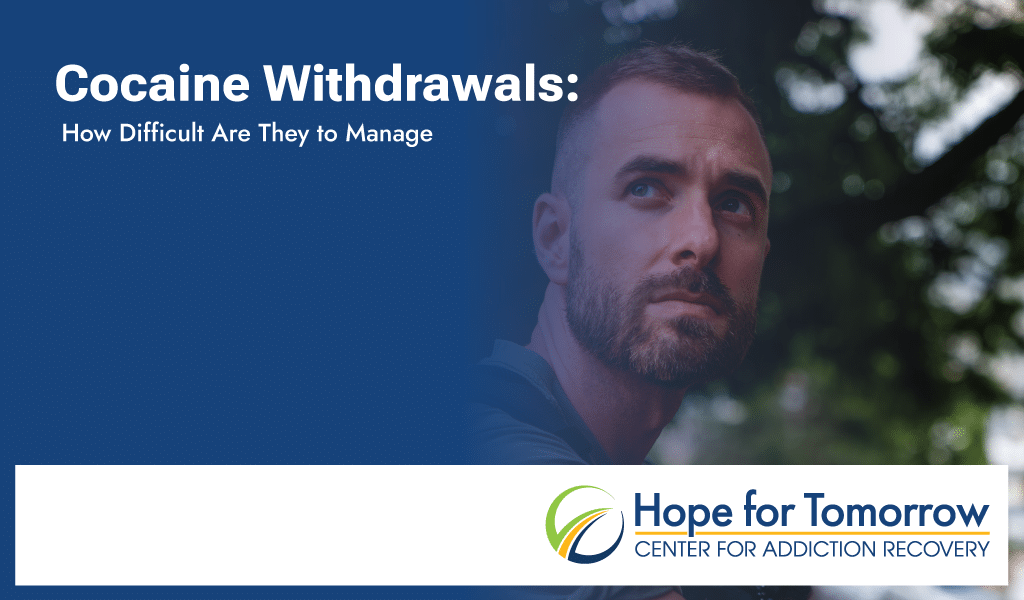

Do you know what it’s like to be stuck in a cycle of chasing euphoria only to be crushed later with extreme feelings of emptiness and anxiety? What about periods of insomnia, then hours upon hours of restless sleep?
People who regularly use cocaine know exactly what this feels like, because it happens every time they try to stop. Unlike other substance withdrawal, cocaine withdrawal doesn’t feel like a physical flu. It feels like a psychological nightmare, so much so that 27% of people using cocaine have attempted suicide, according to a 2022 study.
At Hope for Tomorrow, we know that in matters of the mind, knowledge is power. Understanding why you go through withdrawal, or how your loved one using cocaine feels, can make the process easier. It’s also the first step toward getting help and breaking the cycle.
Cocaine withdrawal is a series of unpleasant symptoms that come on when you stop cocaine after using it for a while, especially if you stop it suddenly. Cocaine is one of the easiest drugs to become dependent on to the point of experiencing withdrawal.
Cocaine impacts the way dopamine, a neurotransmitter responsible for pleasure, works in the brain. It causes a surge of dopamine, which makes cocaine more desirable, while also impacting reward and motivation circuitry in the brain. Over time, your brain adjusts to the presence of cocaine’s excess dopamine, trying to create more of a balance.
This makes it so that when cocaine isn’t in your system, you hardly feel any pleasure at all. When the dopamine from cocaine wears off, you experience withdrawal symptoms, many of which take a toll on mental health.
Cocaine withdrawal symptoms themselves aren’t life-threatening, even if they are painful and uncomfortable. The largest danger that comes with withdrawal is the deep depression it can cause, sometimes prompting suicidal ideation. Withdrawal also often leads to returning to cocaine to make the symptoms go away, and people who go back to a substance after abstaining for a while are always at higher risk for an overdose. This is due to misjudging how much of the drug their body can handle after partially adjusting to life without it.

If you’ve experienced cocaine withdrawal, you know firsthand that it can have a major impact on both physical and mental health.
The psychological effects of withdrawal tend to be the most significant. These symptoms include:
Insomnia is also a common concern during withdrawal. Lack of sleep can trigger symptoms of psychosis, delusions, and hallucinations.
Physical symptoms are rarely the most distressing part of cocaine withdrawal. They often tend to be mild, but they’re still unpleasant. Some physical symptoms are:
How long withdrawal lasts varies, and depends on multiple factors. If you smoke crack cocaine, withdrawal will likely set in more quickly than if you snort powdered cocaine. The amount of the substance you’ve taken, how long you’ve used it, and if you use any other substances alongside it also impact the length and severity of withdrawal. The natural differences in physiology between people ensure everyone experiences it differently, too.
Generally, withdrawal symptoms begin within a few hours after the last dose of cocaine. If you use cocaine for several days or hours at a time, you’ll likely “crash” after experiencing intense depression, sometimes sleeping for 24-48 hours. “Crash” symptoms tend to pass within three to four days for most people, but psychological symptoms can last for weeks, or even months.
Medical detox for cocaine withdrawal is rare. There aren’t medications to ease it like there are for opioid withdrawal and withdrawal from other substances. That doesn’t mean treatment won’t help, because a residential program can be extremely beneficial. It will ensure you have constant access to compassionate, safe care while cocaine leaves your system. Antidepressants may be an option if you experience intense depression during withdrawal.

Cocaine withdrawal can feel like torture to go through alone. Even if you have loved ones at your side, the depression and anxiety can feel insurmountable, and returning to cocaine use feels like the easiest solution to your problems. It isn’t the real solution. Cocaine addiction treatment is. Treatment will empower you to break free of the cycle of cocaine use and withdrawal, and allow you to live in the freedom that comes with recovery.
Hope for Tomorrow offers the compassionate care needed to overcome addiction. Together, we’ll get to the bottom of your cocaine use disorder through different therapies, and treat your mental health concerns simultaneously. No matter who you are, you’re welcome at Hope for Tomorrow, and we’d love to meet you. Give us a call at 877-679-8162 today.
Treatment today for a brighter tomorrow.
When are withdrawal symptoms the strongest?
Psychological withdrawal symptoms tend to be at their worst two weeks after the last dose of cocaine, but they vary based on how the person used cocaine.